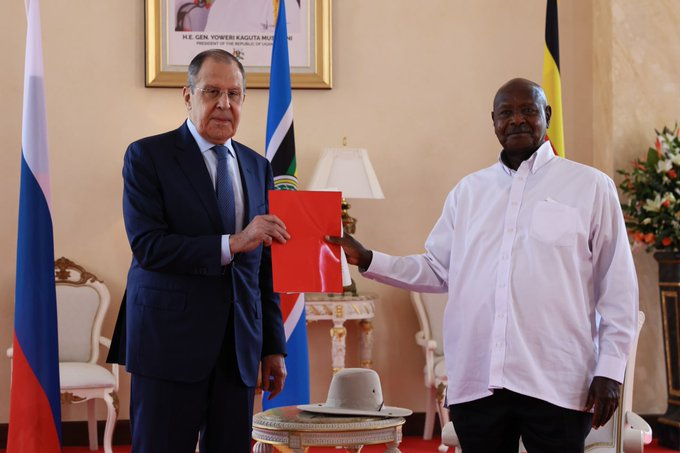President Yoweri Museveni says Uganda will continue cooperating with Russia, noting that it’s not Kampala’s doctrine to be an enemy of other people’s enemies.
He made the remarks on Tuesday at a press conference in Entebbe alongside Russia’s Foreign Minister, H.E Sergey V. Lavrov, who is in Uganda as part of his tour in Africa in a bid to strengthen Moscow’s relations with the continent.
Also read: https://plusnews.ug/russias-lavrov-coming-to-uganda-as-moscow-moves-to-deepen-links-with-africa/
“We want to trade with Russia, we want to trade with all countries of the World. We don’t believe in being enemies of somebody’s enemy, no. We want to make our own enemies not to fight other people’s enemies, this is our doctrine,” Museveni said on Tuesday.
“When there was the cold war, one day they asked me a question, ‘are you pro-east or pro-west?’, I said you must think I am an idiot, why do you think my main job is to be pro-somebody?”
“I am pro myself and I deal with all other people according to how they relate with my own interests. These people think we are stupid, such a question is idiotic. It is not my job to be pro-east or pro-west, I am pro myself and I deal with people according to the way they deal with me,” he added.
On his part, Lavrov praised government of Uganda and its leadership for their refusal to take sides over the conflict in Ukraine.
Uganda was among the about 20 African countries which in March abstained from voting as the UN General Assembly overwhelmingly voted to condemn Russia’s Special Military Operation in Ukraine.
“Those old colonial instincts and old colonial policies are being demonstrated in the practices of western countries, they want everyone to take a side, for or against them,” Lavrov said.
He added that discussions over resolving the energy and food crises “will not depend on the mood of our western counterparts”, adding that “our African colleagues understand it has nothing to do with the special military operation in Ukraine.”
Lavrov started his Africa today in Egypt on Sunday where he will met and held talks with senior government officials before flying to Congo Brazzaville and then Uganda where he arrived on Monday night. He will later travel to Addis Ababa, Ethiopia for bilateral talks with Prime Minister, Dr Abiy Ahmed.
Lavrov is Russia’s most high ranking government official to visit Uganda since the establishment of diplomatic cooperation between the two countries in the 1960s.
The historic visit is largely believed to be aimed at strengthening relations between African States and Russia, a country the West and the U.S wanted isolated with tough sanctions due to its Special Military Operation in Ukraine that started in February this year.
Russia, in this special military operation, which is ongoing, seeks to demilitarize Ukraine so that there would be no weapons posing a threat to Russia, protecting the people of Donetsk and Lugansk Republics and to denazify Ukraine by not only canceling laws encouraging Nazi ideology and practices, but also, withdrawing any legislation, which discriminates Russians.
Uganda’s relations with Russia
At the peak of the conflict, the West and the U.S, embarked on a disinformation campaign with a biased and single sided reportage on the conflict, portraying Russia as war mongers.
At the time, the Russian Embassy in Kampala announced that Kremlin-linked Russia Today had secured regular space on Uganda’s state broadcaster, UBC, to tell its side of the story.
Also, at the start of June, the ruling party in Uganda, National Resistance Movement (NRM), signed a memorandum of understanding with Russia’s ruling party to bolster cooperation.
For the same purpose, President Museveni also held a virtual call with former president Dmitry Medvedev, who is the chairman of the ruling party.
President Museveni and the Russian leader, Vladimir Putin have had a good decade of increasing communication and cooperation in both military and non-military sectors. Traditionally, Russia has been Uganda’s number one source of military equipment.
Moscow has also been helping Museveni with technology and knowledge transfer in the military sector.
In 2012, Museveni spent four days in Moscow on a state visit where he gave a lecture at the Moscow State Institute of International Relations University, lashing out at the ‘arrogant’ Western world.
“With improvements in weapons technology, with the use of precision bombs, stealth bombers, cruise missiles, anti-missile technology, ECM technology,” he said. “Renewed arrogance is manifesting itself in some quarters in the Western world.”
In 2011, Museveni purchased six Sukhoi Su-30MK2 fighters from Russia amidst protest from government officials, including then Central Bank Governor Emmanuel Mutebile. The planes cost about $740m.
Such transactions rarely get reflected in trade statistics. However, there was a more than 10-fold increase in Russia’s export volumes to Uganda in 2011, according to UN comtrade data.
Russia is a major trade and investment partner with Uganda and Africa generally, while Ukraine is not among the main sources of trade or investment, according to available figures and national statistics.
Talking of trade between Uganda and Ukraine, remains one of wheat, military hardware and education, especially in science studies.
In 2020, for example, Russia supplied 33 percent of Uganda’s wheat and meslin imports worth US$ 50 million, followed by Argentina with 28 percent or US$ 43 million. Ukraine sent to Uganda wheat worth US$ 17.7 million or 17 percent. This is the year after Museveni returned to Russia in 2019 for the first Russia-Africa summit.
In the past decade, Uganda has also tried to attract Russian private sector players with no success. In 2015, a consortium led by Russian companies was a surprise winner of a contract to construct a $4bn oil refinery. The company however walked away from the deal months later.

